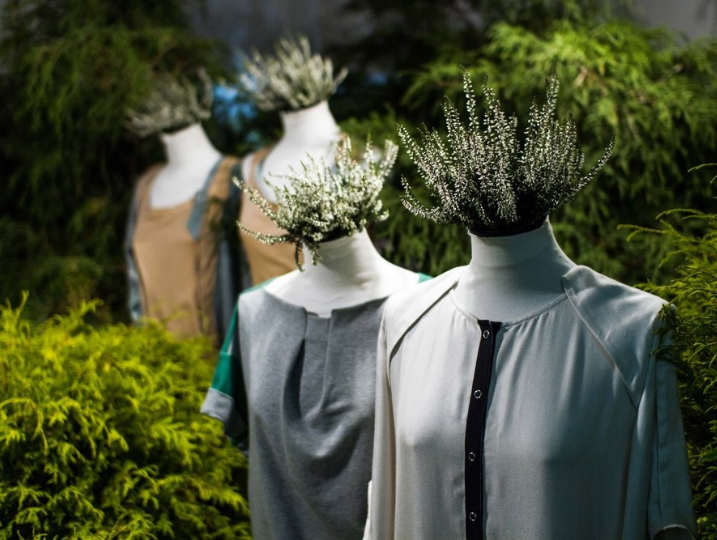Vegan Vs Sustainable Fashion

Author : Amal Rahiman
Fashion is surrounded by a lot of terminologies these days. Fast, slow, ethical, sustainable, vegan, fair-trade, mindful…the list just goes on.
Ever stopped to wonder what they all mean? What if they all simply mean the same? Why use so many words to say eco-friendly fashion?
While all these words may have some similarities, they do not actually mean the same! It might surprise you but if your clothing is vegan, then it is probably not sustainable, but in fact, might even cause havoc to the eco-system due to its complex production process. Sustainable fashion is also not always vegan, as the idea behind sustainable fashion is to protect the Earth as a whole, and not just animal life.
Similarly, slow fashion need not necessarily be fair-trade, and ethical fashion could be non-vegan clothing too. Consumers are being bombarded not just with new trends and designs, but also with increasing terminology. To reduce confusion and to help you make educated decisions, we have put together this post to explain in detail what each term means so that you know for a fact what you are supporting.
Sustainable Fashion:
Sustainable fashion follows everything possible to produce clothing and accessories, with the least carbon footprint left behind. Leather, silk, or cashmere might be used as sustainable fashion and promotes the use of products that can stand long-term wear and use. This is why sustainable fashion is not always vegan.
Materials that are organic, recycled, upcycled, and environmental-friendly fall under sustainable fashion. Production processes that use renewable energy also are included. Organic cotton, upcycled leather, wool, recycled polyester, and hemp are all examples of sustainable fashion.
Most of the time, sustainable fashion also includes fair working policies, where labourers are paid timely and due wages and are working under humane conditions. This does fall under ethical fashion, but this is also where sustainable fashion, fair-trade fashion, and ethical fashion intersect.
Ethical Fashion (or Fair-Trade Fashion):
This is where brands explicitly claim that every person working with the brand has been treated fairly, with due wages paid. Not a lot of concern is given to animal life or the environment unless these brands specify that their materials are ethically sourced too. Brands will have to be certified before they can claim that they are ethical, so look out for any official certifications on the packaging. If it’s a small business, you could even ask them over email and make your choice from that.
Slow Fashion:
Slow fashion promotes the use of materials for a longer time. Rather than disposing of clothes for new trends, you buy and use pieces that will benefit you in the long run. Slow fashion does not follow mass trends, and instead produces pieces that you can keep wearing time and again. This makes it difficult to be vegan, but usually, these pieces are eco-friendly or sustainable.
Vegan Fashion:
Veganism is not just about food. It’s a lifestyle. Vegan fashion completely excludes the use of animal products, such as fur, leather, and even wool. It also involves the use of cosmetics that are cruelty-free, or not tested on animals.
The problem though is that vegan fashion is not always sustainable. The alternative to animal leather is plastic leather or other plastic-based materials. The use of plastics in our clothing releases microplastics into the environment, polluting our land and seas. Microplastics will be released each time we wash our clothes and the pollution that comes along with producing plastic is already well known. So, although vegan fashion protects animal life, it does very little to protect the environment as a whole.
As a consumer, it’s up to you to make informed choices. There is a lot of green-washing that happens, where brands claim to be ethical or sustainable, just because that is in trend. Do your research and find out if the claims are true before you support such businesses. If a brand claims to support slow fashion but comes out with new designs every week, then clearly, they are not slow fashion. Be mindful while shopping.
Disclaimer: The content provided in this article is provided for information purposes only and is not a substitute for professional advice and consultation, including professional medical advice and consultation; it is provided with the understanding that HerbivoPvt. Ltd. is not engaged in the provision or rendering of medical advice or services. The opinions and content included in the article are the views of the author only, and Herbivo does not endorse or recommend any such content or information, or any product or service mentioned in the article. You understand and agree that Herbivo shall not be liable for any claim, loss, or damage arising out of the use of, or reliance upon any content or information in the article.




